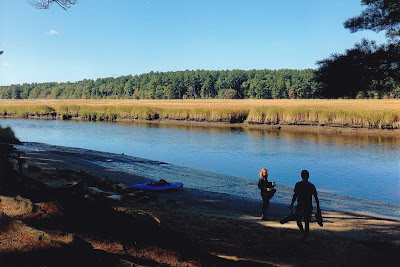 |
| Kayakers at Couch Beach on the North River |
One day this summer — I don’t recall when it was or what I was doing at the time — I remember sighing, to no one in particular, “What a perfect day . . . I wish I was out on the river.”
I was probably gardening, or hanging laundry, or taking care of some other task that “needed” to be done. Perhaps I gazed longingly at my kayak, growing dusty in its storage bay. Perhaps I could feel, for a moment, that thrill of buoyancy when my boat first takes to the water. One thing was for sure: I was not going to let another year go by without getting out on the river.
It was September when I finally cleaned the spider webs out of my kayak, strapped it to the roof of my car, and hauled it three miles down the road to the Union Street Bridge. I wondered: if I lived where I could just carry my boat across the back yard, would I have spent more time on the water? But things come and go in our lives like reeds floating on the tide — here today, gone tomorrow; returning perhaps, but maybe not. I just hadn’t been in a kayaking frame of mind.
I used to spend a lot of time on the North River, so when I launched my boat, I thought I knew what to expect. It didn’t take me long to get reacquainted with the rhythm of the paddle strokes. I settled into a comfortable pace, and began to look around.
At first glance, things hadn’t changed much since the last time I was there. “Here’s the old packet landing,” I thought, “just as I remember it, only a little more worn. Here are the same boats that have been moored midstream every summer since I can remember . . . Nothing looks much different from last time.”
I was so busy dismissing the familiar that I neglected to see what was new. Had my companion not pointed it out, I would never have noticed the blue heron of I passed within 10 feet of! Inspired to be more observant from that point on, the more I looked, the more I saw.
We headed downstream, along the perimeter of Nelson Forest and then into Cove Creek, a narrow stream that snakes through the marsh, ever tapering. Within minutes we saw egrets, stark white against the rich green grass. A few bends further along, we startled some mud-colored ducks, lighting from their perch in a hurry when they sensed our presence. Patches of phragmites towered twelve feet overhead. We were going to paddle as far into the creek as we could, but there was so much to see, eventually we just sat still.
Time seems to slow down on the river. When I think back on that trip up Cove Creek, the memory passes in a flash. Yet I know for certain we spent an hour there, startling ducks and marveling at the marsh grass.
Little things become large when you stop to notice them. I hold the question in my mind and the details begin to fill in — how the sun filtered through the reeds, the earthy scent of the mud, a pop-top beer can, rusted and beached on a patch of burnt grass. There was an abandoned dock, on the edge of the creek, in the middle of nowhere. What piece of land it would have been connected to? There was no indication.
Repetition brings a comforting familiarity. My morning walks, which follow the same route day after day, have revealed a lot to me about a 2-mile loop of residential streets. It’s interesting: when I began walking that route, I noticed very little. I was intent on getting my exercise, and the setting didn’t really matter.
Later, as the novelty of the walk wore off, I looked around more. It was all things I’d seen before, but when I started to watch for the details, the ordinary was transformed! Suddenly there was so much to take in: a giant spider web threaded among the phone wires, bright red berries on an evergreen shrub, a sidewalk buckling in a star pattern, cracking from the pressure of growing sumac roots.
Even the most familiar place has much to offer when you turn your eyes toward rediscovery.
by Kezia Bacon Bernstein, Correspondent
January 2001
Kezia Bacon Bernstein’s articles appear courtesy of the North and South Rivers Watershed Association, a local non-profit organization devoted to the preservation, restoration, maintenance and conservation of the North and South Rivers and their watershed. For membership information and a copy of their latest newsletter, contact NSRWA at (781) 659-8168.

